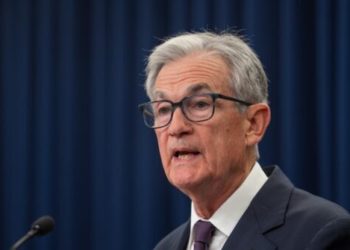The Real Story Behind America’s “Harmless” Deficits
The economists’ case in Learning Resources v. Trump gets the causality wrong.
When a group of economists filed an amicus brief in Learning Resources v. Trump, one of the cases brought against the Trump administration’s tariff policies, they offered a confident defense of America’s trade deficits. These imbalances, they said, are nothing to fear. A deficit in trade is merely the mirror image of a surplus in capital inflows. It simply means foreigners are eager to invest in the United States. In this view, America runs trade deficits because it is an attractive place to put money—a mark of strength, not weakness.
The argument has the virtue of neatness and the vice of being detached from economic reality. It confuses an accounting identity with an economic mechanism. The fact that trade and capital balances must offset tells us nothing about which drives which—or what the real-world consequences are when the books balance by leaking domestic income abroad.
In today’s Breitbart Business Digest, we’ll unpack the deep flaws in the economists’ case for treating America’s trade deficits as harmless. Tomorrow, we’ll look at what follows—how the imbalance shapes fiscal policy, what it really means to call a policy “protectionist,” and what’s at stake in Learning Resources v. Trump.
The Economists Who Mistook an Equation for an Economy
In the simplest closed-economy model, everyone’s spending is someone else’s income. A household’s purchase becomes a firm’s revenue; the firm’s payroll becomes another household’s income. So long as spending and production remain in balance, the economy hums along at full employment.
When we open that system to trade, nothing essential changes. Americans buy imports, giving foreigners income to buy our exports. Foreigners buy our products, giving us income to buy theirs. So long as the flows are balanced, global spending still equals global income.
Persistent imbalances change everything. When Americans buy more from abroad than foreigners buy from us, more spending leaves the domestic income stream than returns to it. Each dollar of U.S. consumer spending now generates less revenue for U.S. producers. The difference shows up as slower output growth, lower wages, and, unless something offsets it, higher unemployment. The United States is not consuming too much; it is earning too little relative to what it spends.
The economists behind the brief treat this outcome as a matter of taste. Americans, they imply, simply prefer present consumption to future consumption and therefore borrow the difference. But the direction of causality runs the other way. We do not run a trade deficit because the American public collectively decides to live beyond its means. We run one because our productive capacity is held back by the persistent surpluses of others.
Surplus countries—China, Germany, Japan, and their imitators—pursue policies that maximize employment and sustain export surpluses. They restrain domestic consumption, manage exchange rates, and channel national savings into foreign assets. By producing more than they consume, they create a surplus of goods and of savings that must find an outlet somewhere else. In a world of open markets, that “somewhere else” is the United States.
We play the accommodating partner. Our markets are open, our currency is the reserve currency, and our financial system is the world’s safest depository for foreign savings. The U.S. does not choose a trade deficit. It permits one. By allowing others to overproduce, we accept the corresponding role of over-consuming, not out of excess appetite but out of structural necessity. Our spending provides the demand that surplus economies suppress at home.
A Post-World War II Strategy That Lasted Nearly 80 Years
This did not happen by accident. And it wasn’t something others inflicted on us, at least at first. When we emerged from World War II as the world’s greatest economy, in part because the war was almost exclusively fought outside of the continental U.S. while Europe and Asia were ravaged, we set out to rebuild the economies of our allies. In part, the hope was that sharing our prosperity would create markets for our products. And the Cold War added a strategic imperative. We wanted the noncommunist world to be wealthy enough to turn a deaf ear on the siren song of communism.
This was not supposed to be a permanent arrangement. The idea was that the trade imbalances would cure themselves as the world marched toward free and more open trade, greater efficiency, and a world order dominated by liberal democracy. But that idea didn’t work out. Instead, we’ve run 54 years of trade deficits, and our manufacturing capacity has degraded. When Ronald Reagan was president, we manufactured around 90 percent of the goods we consumed. Today, it is closer to 75 percent. And until Trump came along, there was no end in sight.
The persistent trade asymmetry has a simple consequence: it starves the United States of income. When foreign nations deliberately under-consume, the demand that would have sustained their own workers is instead met by American consumers. Our spending crosses borders, but the income that would have come back through exports does not. A portion of every dollar Americans spend ceases to circulate in the domestic economy. The gap must be filled, or the economy contracts.
The filling comes through borrowing. When private credit expands—say, during a housing boom—household debt temporarily replaces the missing income. When private credit collapses, the government steps in. Washington’s fiscal deficit is not primarily a discretionary act of stimulus. It is the almost-automatic counterpart of the external deficit. Politicians who do not want to oversee rising unemployment and falling income will use deficit spending to keep the economy afloat. Dollars that leave the country through trade eventually re-enter through Treasury auctions and federal spending.
In that sense, the U.S. fiscal deficit is the mirror of the trade deficit. Attempts to close one without addressing the other merely shift the imbalance around the balance sheet. Cut government spending while imports still exceed exports, and national income falls until tax revenue declines and the deficit reopens. The external imbalance makes the fiscal imbalance inevitable.
This, not the accountants’ symmetry, is the real dynamic at work. The trade deficit is not a benign reflection of global confidence or a desire to hold U.S. assets. It is a continuing drain on domestic income offset by debt. The capital inflows celebrated by the amici brief are not gifts but the financial record of that drain being recycled back into our economy as borrowing.
In today’s Breitbart Business Digest, we took apart the economists’ favorite myth—that America’s trade deficit is nothing more than the world’s compliment. Tomorrow, we’ll follow the money: how the dollars leave, how they return as debt, and what that means for U.S. policy and the Supreme Court.
The post Breitbart Business Digest: The Hidden Cost of America’s Trade Deficit Is a Permanent Budget Deficit appeared first on Breitbart.




